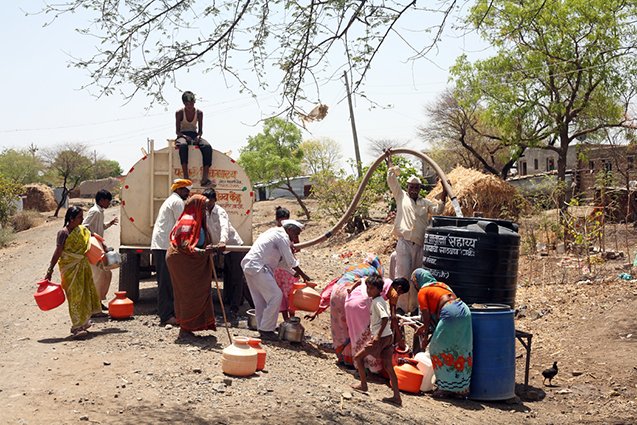Two years of deficit rainfall and failure of four agricultural seasons caused one of the worst droughts India has witnessed since its Independence. According to government estimates, the unprecedented crisis has affected a staggering 330 million people, or more than a quarter of the country’s population, living in over 2.5 lakh villages across 11 states.
The worst affected areas were Bundelkhand region comprising of seven districts in Uttar Pradesh and six districts in Madhya Pradesh; and Marathwada region comprising of eight districts of Maharashtra. In addition a large part of Orissa – 29,176 villages 28 districts – also suffered drought conditions. It has a devastating impact on water, agriculture, livelihoods, food production and food security, natural resources and also on exchequer.
The major crises that resulted because of the drought at the beginning of the our intervention period were:
- 90% of Sources of potable water had dried up – Most of the open wells, hand-pumps and bore-wells had dried up and women and children had to walk for 7-10 Kms to collect water.
- Successive crop failures leading to Food crises – As a result of four successive seasons of crop failures due to drought and unseasonal rains about 80% of the HHs in villages were out of food stock. Food was being procured on a day to day basis on the daily wages if they are able to get.
- Lack of livelihood options in villages resulting into Migration – The marginal farmers and landless were left with no livelihood options and were forced to migrate to nearby towns for daily wages leaving old people and children in the village. The government’s promise of providing 150 days of work under MGNREGA was not getting materialised.
- Fodder scarcity – had been a great concern with extreme impacts on livestock as thousands of Cattle and small livestock together are facing survival threats.
- Poor safety net provisions of the state & lack of wide access – The state announced measures for the drought affected families in regard to potable water, food grains and fodder for the drought affected villages but the implementation of these measures were very poor. Many affected families and villages were unable to access these measures.

Photo: Srikant Kolari/ActionAid
ActionAid India’s Response
As the crisis started worsening towards the month of Month, ActionAid India together with its allied organisations started emergency relief efforts in affected villages in Maharashtra, Uttar Pradesh, Madhya Pradesh, Odisha and Telangana. Our focus was to reach out to the most vulnerable families and groups who are most affected and find it difficult to access relief services.
As part of our emergency relief efforts, we provided dry rations, facilitated the provision of drinking water, set up fodder camps and organised health camps in areas hit hard by the drought. We also focused on ensuring entitlements like PDS, ICDS, MDM, MGNREGA, and crop compensation and long term work on water harvesting and sustainable farming systems.
We carried out drought specific emergency response in over 500 villages spread across 26 districts in six states. The villages covered are:
- Madhya Pradesh (MP): 80 villages in 3 districts (Tikamgarh, Chhattarpur, and Sagar)
- Uttar Pradesh (UP): 125 villages of 4 districts (Banda, Hamirpur, Mahoba, and Lalitpur)
- Maharashtra: 60 villages in 4 districts (Beed, Osmanabad, Jalana, Aurangabad)
- Odisha: 120 villages (Bargarh, Ganjam, Kandhmal, Koraput, Nuapara, Sundargarh)
- Telangana: 50 villages in 2 districts (Nalgonda and Medak)
- Rajasthan: 83 villages from 19 blocks of 7 districts (Nagour, Jaipur, Baran, Banswara, Udaipur, Barmer, chittodgarh) while 4 districts named Bheelwara, Alwar, Bikaner and dousa are still in process of compiling the information in Rajasthan state
Immediate Emergency Efforts
- Provision of Dry ration kits to 800 most vulnerable families (4000 people) in 20 villages; community kitchens in 5 villages
- Provisioning of potable drinking water for 2500 families in 25 villages (More than 10000 people)
- Cooked Meals twice daily were offered to destitute and old aged. Community Kitchens were initiated in 4 villages where 122 people provided meal for 30 days.
- Agricultural input support provided to 100 farmers letting them revive their agriculture
- Carried out rapid assessment of the situation of the drought and its impact, needs assessment from people’s perspective in UP, MP, Odisha, Rajasthan and Maharashtra
Overview of our advocacy work
With our continuous liaison with the concerned government authorities, over 400 hand pumps were repaired and 33 new pumps were installed in Madhya Pradesh and Uttar Pradesh. We have helped in deepening of 34 public wells and digging 22 new ponds in Madhya Pradesh.
Public Hearings at district and state levels in Madhya Pradesh, Odisha, Uttar Pradesh and Rajasthan were organised focussing on drought in the month of June.
A national consultation on drought was held (20th May 2016) in Delhi which was attended by civil society organisations from 5 drought hit states along with many donors and INGOs and rights organisations.
Active engagement in larger campaign of social movements in the country, including 10 days of Jal Hul Yatra in Maharashtra, Bundelkhand regions of Madhya Pradesh and Uttar Pradesh and 3 days in Telangana state. Our partners and communities were actively involved in mobilisation and public action in all the states covered under the campaign.
Along with our allied organisation, we have been monitoring the implementation of social security schemes like Public Distribution System (PDS) providing subsidised grains; Mid day Meal (MDM) being provided to the school children (during summer vacation); and supplementary food and nutrition provided under Integrated Child Development Services (ICDS) etc.
We have been engaging with the state governments to ensure provision of drinking water, repairing of bore-wells, community kitchens, dry ration kits, fodder provision, etc.
Facilitating processes to ensure that people avail regular and additional work days under MGNREGS at village level.
